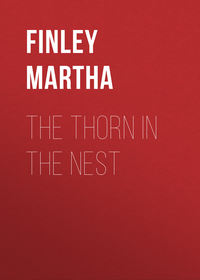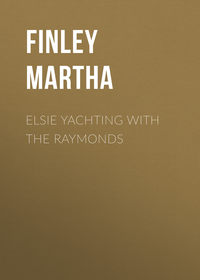
Elsie's Journey on Inland Waters
"Montgomery, his aid, Major M'Phunn, Captain Cheesman, and several privates were killed, and the rest, appalled at the disaster and the death of their brave commander, fled back to Wolf's Cove."
"How dreadful!" sighed Grace. "Montgomery's death alone was a great loss to our country, was it not, papa?"
"It was indeed! throughout the whole country his death was felt to be a great calamity, and even in England, upon the floor of Parliament, his praises were sounded by Burke, Chatham, and Barre."
"Was he buried there – in Canada?" she asked.
"Yes; within the wall that surrounded a powder magazine, near the ramparts on St. Louis Street. There his body remained for forty-two years, when it was removed to New York and reinterred near the monument erected to his memory by the United States.
"While all this was going on at Cape Diamond, Arnold and his division were passing along the St. Charles. The snow was worse drifted there than on the St. Lawrence; but he and his men pressed on till they reached a narrow street, where, under a high jutting rock, the enemy had a two-gun picketed battery well manned. Like Montgomery he headed his men, leading Lamb's artillery to the attack, and while doing so received a very bad wound in the knee. He had to be carried to the general hospital, and there heard the sad news of Montgomery's death.
"Morgan now took command of Arnold's division, and for more than an hour the Americans withstood the storm of musket balls and grape-shot at the first barrier, and finally carried it, the deadly aim of the riflemen causing great consternation among the ranks of the British and Canadians. Then they rushed on to the second, where they fought fiercely for three hours, many being killed on both sides.
"Our men finally captured the barrier, and were preparing to rush into the town, when Carleton sent a large detachment from his garrison, through Palace Gate, to attack them in the rear. He and his men had heard of the death of Montgomery and the retreat of his detachment, which inspired them with renewed courage. The Palace Gate was thrown open suddenly and the troops rushed out, surprising Captain Dearborn and some provincials stationed there, and they were taken prisoners.
"Morgan heard of that disaster and of the death of Montgomery while he and his men were pressing on vigorously into the town; also that the enemy was advancing on his rear. He saw that further efforts were useless, as he was surrounded by the foe on all sides, and he and his men surrendered themselves prisoners of war."
"The whole American army was not taken, if I remember right, papa?" said Grace interrogatively.
"No," replied her father, "the rest of the division retreated to their camp, leaving behind a field-piece and some mortars. Colonel Arnold took command of what was left of the patriot army and was promoted to the rank of brigadier-general. He did not feel safe so near the city, so retired about three miles from it and intrenched himself as well as circumstances would permit. He remained there until the 1st of April, but accomplished nothing of any consequence. General Thomas, who was appointed to succeed Montgomery, arrived early in May; but the British received large reinforcements and our men were driven out of Canada."
"Perhaps it was just as well," remarked Lucilla, in a tone of indifference, "our country is large enough, and I, for one, don't covet Canada."
"I think there are very few Americans, if any, who do," returned her father with a slightly amused smile. "Our country is large enough, and while we like the Canadians as friends and neighbors, we have no wish to change their political relations, or to rob England of her colonies."
"I think you are quite correct about that matter, captain," said Mr. Dinsmore. "I have yet to hear from any one of our people an expression of a desire to see Canada, or any part of British America, incorporated into our Union. We have a great country and are fully satisfied with its size."
"'Eternal vigilance is the price of liberty,'" quoted Walter, "and we need to be careful to exercise that, don't we, grandpa?"
"Certainly we do," was the reply, "toward foes within and foes without; and that especially by diffusing knowledge and teaching Gospel truth."
With that they withdrew from the table and gathered upon the deck. The yacht was moving down the river, but through the gathering gloom little could be seen of it or its shores, and wearied with the day's jaunt, all presently retired to their staterooms.
CHAPTER XIII
When the Dolphin's passengers awoke the next morning they found she had reached Quebec and was lying quietly at the wharf there. Anxious to view all places of historic interest in and about the city and to be again on their eastward way, they set out as promptly as they conveniently could after leaving the breakfast table.
There were so many points of interest, and at some they tarried so long, that the sun had set and shadows were already creeping over land and water as they regained the Dolphin's deck.
Ned was fast asleep in his father's arms, little Elsie hardly able to keep her eyes open, and they were taken at once to their stateroom by their parents, the others hurrying to theirs to make due preparation for a suitable appearance at the supper table.
The saloon through which they passed was but dimly lighted as yet, and no one noticed a lady and gentleman sitting side by side in a far corner where the shadows were deepest. As the last stateroom door closed upon its occupants, the gentleman leaned down over the lady, saying in a tone scarcely above a whisper, "Ah ha, ah ha, um h'm! they are all safe in their rooms for the present, and now let us go upon deck while we may unperceived. Raymond will be sure to be up there presently, if none o' the rest."
The lady returned a silent assent, both rose, crossed the room noiselessly, ascended the cabin stairway, and in another minute were seated side by side in the shadow of the pilot house, the man at the wheel greeting them with a quiet smile of amusement.
"They didn't see you, sir?" he asked in an undertone.
"No. And you kept our counsel?"
"An easy thing to do under the circumstances, as the captain asked no question, but passed quickly on down into the cabin. But I think, sir, you'd best let him know you're here pretty soon, or the yacht may be starting with you and the lady on it, and you haven't any baggage aboard."
"That's true; but the captain shall know of our presence and give us time to land before he weighs anchor."
"And here he comes now, sir," as at that moment Captain Raymond's step and voice were heard near the companion-way. "There, do you hear, sir? he's giving the order to weigh anchor and proceed down the river."
"Hallo, there, cap'in! jest you wait a bit, sir. There's a couple o' stowaways aboard and I'd advise ye to get rid o' them afore ye start," called a voice that seemed to come from some part of the vessel in the captain's rear.
He turned quickly, asking, "And you are one of them?"
"Well, sir, that's neither here nor there," returned the voice; "but if I was in your place, I'd put 'em off afore starting."
"But perhaps the poor fellows need some help," returned the captain. "Tell them to show themselves and I'll not be hard upon them."
"Well, now," exclaimed the invisible speaker, "I must say you're a good, kind-hearted sort o' man, spite o' owning this grand yacht and a lot o' money, so I'll call 'em. Halloo, here, mates, don't be afeard to show yerselves and I reckon ye'll git some grub if nuthin' else."
"Wait a little till this matter is settled," Captain Raymond said, reversing his order about the anchor, then asked, "Have any strangers been allowed to board the yacht during my absence?" addressing his query to the man at the helm.
"Well, no, sir; not to say strangers," answered the man, hesitatingly and with a slight laugh.
"Ah! some old friends, though; just as I suspected," and with the words Captain Raymond glanced searchingly about, then with a quick step drew near the hiding place of the stowaways.
"Ah, cousins, I see my guess was not wide of the mark," he said, with his good-humored laugh and giving a hand to each. "You are as welcome as sunlight in the morning and shall have all the 'grub' you can stow away. But why not send for your baggage and go on home with us? You have seen all the sights of Quebec, have you not?"
"About all, captain," replied Mr. Lilburn, "and we thank you heartily for your very kind invitation. But though travel on the Dolphin, especially in such good company, is most delightful, we would crowd you too much, I fear."
"Yes," said Annis, "and it would be very selfish to give ourselves so much pleasure at the cost of such inconvenience to our kind friends – our dear relatives. But seeing the Dolphin lying here, we felt that we could not deny ourselves the great pleasure of a peep at you all."
"The voyage is not likely to be a long one, or the crowding worth mentioning," returned Captain Raymond in his most cordial tone; "and the slight inconvenience will be paid for over and over again by the pleasure of your company."
"It is most kind in you to say so, captain," said Annis, with a pleased look, "but are you quite sure the others would be equally willing to endure the inconvenience?"
"I haven't a doubt of it," he replied emphatically, "and I know of nothing that could happen just now that would afford our dear mother more pleasure; for I have often heard her speak of you as her very dear friend and cousin, and I know she has missed you sadly since you left us for your bridal trip. If you have seen all you care to of the city, do let me send at once for your baggage and give her and the rest the pleasant surprise of finding you presently at the supper table."
"Thank you very much," she said, smiling up into his pleasant face; "you don't know how tempting your kind offer is. We have seen all we care to of this interesting old city and were intending to leave it to-night; but – "
"Ah, my dear cousin, just omit the objections," interrupted Captain Raymond laughingly, "give me the address and let me send at once for your trunks. Excuse my rudeness in not waiting to hear all you could say against my plan, but it is growing late and I can hear it all afterward if you care to have me do so. Ah, here comes mother and my wife now," he added, as the two stepped upon the deck at that moment.
Then moving quickly toward them, "I have something to show you, mother and Vi," he said; "a couple of uncommonly interesting stowaways, about the disposal of whom I should like to have your advice."
"Stowaways?" repeated Violet, in accents of surprise. "Do they think we are about to cross the ocean?"
"Suppose you come and have a little talk with them," said her husband, leading the way toward the intruders, the ladies following close in his rear.
"Oh, Cousins Annis and Ronald! How delightful!" both exclaimed at sight of the intruders, Vi adding in gleeful tones, "We'll stow you away safely and keep you as long as possible."
Then, as Annis began repeating her objection on the score of the inevitable crowding, "Oh, that will only be fun," she said. "I am not urging you out of politeness, but because I really want your and Cousin Ronald's pleasant company, and know that all the rest will be delighted to have it."
"Certainly they will," added Grandma Elsie. "And you surely cannot be so unkind, Annis dear, as to refuse us that pleasure."
"Ah, Annis, my bonny bride, with such assurances we need not hesitate," laughed Mr. Lilburn. "Let us accept the kind invitation and do our best to add to the pleasure of our generous-hearted entertainers."
"You can hardly refuse to follow such good advice coming from such a source, Annis," said Violet, while Captain Raymond again inquired of Mr. Lilburn where he should send for the trunks.
The requested information was given, a messenger at once despatched for the luggage, and, as the summons to the supper table came at the same moment, all the company upon the deck at once descended the companion-way and met the remainder of the family party at the table. The bride and groom had no reason to complain of their reception, for everyone seemed delighted to see them.
Fatigue was forgotten in the enjoyment of each other's society, the toothsome viands and the interest of comparing notes as to their experiences – all they had seen, heard, and done – since the parting of a few days before, when the bride and groom left the Dolphin for the railroad train at Michigan City.
The luggage had arrived and the vessel was in motion down the river some time before they left the table.
"You will hardly make another stop in this part of Her Majesty's dominions, captain, but go directly home, I presume?" remarked Mr. Lilburn inquiringly, at a pause in the conversation.
"Yes and no," returned Captain Raymond in playful tones, "I hardly expect to stop again until we reach Narragansett Bay; but there we expect to visit Newport, and Paradise Valley, a few miles out of it, on the same island. We have some cousins summering there now, who are most urgent with us to come and take temporary possession of a vacant cottage very near the one occupied by them; and we have decided to do so, should nothing interfere. And now, I hope you and Cousin Annis will decide to go there with us, and afterward return home with us in the Dolphin."
As soon as the captain had ceased speaking, Mrs. Travilla and Violet, the young people also, joined their urgent solicitations to his, and as Annis seemed much pleased with the idea, and Mr. Lilburn himself had really no objection, it was presently decided that they would accept the invitation.
They now left the table and gathered upon the deck for a time; but as there was no moon that night little could be seen of the country through which they were passing, and all being somewhat weary with the exertions of the day, they presently held their regular evening service of prayer, praise, and reading of the Scriptures, then bade an affectionate good-night and retired to rest.
CHAPTER XIV
Our friends had a delightful voyage through the Gulf of St. Lawrence, down the coasts of New Brunswick, Maine, Massachusetts, and Rhode Island as far as Newport on Narragansett Bay. They left the yacht lying in the harbor there for the present, and taking hired carriages drove out to the cottages of which their cousin, Mrs. Embury, had written, where they found her and Mr. Embury, with their children, also Mr. and Mrs. Cyril Keith, forming a large and interesting family party, and filling one of the cottages; but the other was still vacant, and large enough to accommodate very conveniently the entire party from the Dolphin.
Their welcome was of the warmest. They found their new temporary abode comfortably, though not elegantly, furnished, open and well aired; for, though their friends had been uncertain of the exact time of their arrival, they had expected them daily and made ready, as far as possible, for their comfort and enjoyment.
"Ah, if we had only known just when you would get here, your supper should have been ready," said Isadore, when greetings had been exchanged and the excitement of the arrival had calmed down somewhat. "But I will have it on the table as soon as possible. I am housekeeper this week. Molly and I take the position week about, each trying to outdo the other in catering for the united family."
"Oh, thank you! but we had supper on the yacht just before leaving her," said Violet. "Besides, we consider ourselves at home and do not expect or wish to be treated as company."
"And we have brought a supply of provisions of various kinds, which we hope you may be willing to share with us," said the captain.
"That was very kind and thoughtful in you, cousin captain," returned Isadore with a pleased look, "and I hardly think any of us will feel inclined to reject your dainties; though we have fared very well indeed since coming here."
"Please accept my thanks also, and those of our husbands and children," said Molly. "Aunt Rose and Cousin Elsie, please sit down here with the gentlemen and let us younger ones attend to the unpacking and arranging of the contents of your trunks. If you will trust us, I can assure you we shall enjoy doing it. At least I am sure I shall."
"That is a kind offer, Molly," said Mrs. Travilla, "but we have done nothing to-day to tire us and I, for one, am not in the least fatigued; so ought not to indulge my love of ease at your expense."
"Your love of ease, Cousin Elsie!" laughed Molly. "I never discovered that you had any."
"No; but she has a daughter who is both able and willing to attend to the duty in question," said Rosie Travilla. "So sit you down, mother dear, and enjoy this pleasant company, while we younger folks unpack and find places for your goods and chattels."
"Yes, do, mother," said Captain Raymond, bringing forward an easy chair for her. "Can't you trust me to oversee and assist these younger folks? If not we will seat you in state in some spot convenient for you to do that part in person."
"Thanks, captain," she returned with a smile of amusement "as commanding and giving directions has been your business for so many years, I think you may be trusted to attend to the matter even without my added supervision."
"Yes, come along, sir," said Rosie, leading the way, "but please to remember that you and we girls are not in the schoolroom."
"I shall endeavor to keep that fact in mind, my sage young sister," he said in return.
"But it won't make any difference in your authority over your own daughters, I am happy to know, papa," Lucilla said, with a loving, smiling look up into his face.
"No; they are mine and under my orders always and under all circumstances," he returned; "and I think would not have it other wise if they might."
"Indeed we would not," said Grace, who, as usual, was near her father and sister. "May I help, papa?"
"Well, Gracie, I think you are not really needed, and would enjoy yourself better out yonder on the porches or on the grass with your little brother and sister and the others, telling them stories, singing them little songs or playing games with them."
"Yes; do try that, Gracie, and I shall be much obliged," Violet said, joining them at the moment. "I have just left them with the promise to ask it of you."
Grace acquiesced, went back at once, and for the next half hour devoted herself to the amusement of the children, to their great satisfaction and enjoyment.
"And you, Madam Raymond, would do well to go back to the society of your older friends and exercise your many gifts for their entertainment," remarked the captain, speaking in playful tones to his young wife, as Grace disappeared.
"No, my dear, I prefer to exercise them for yours, if you will permit it," she returned.
"Ah, you fear to trust me to do the work without the supervision of my capable young wife?" he returned laughingly.
"Possibly it may be done a trifle better, or, at least, more to my mind, with that," she retorted, with becoming gravity. "At all events, I shall know better where to look for what I want, so that, in the end, I shall save myself trouble."
"Ah, then, I will make no further objection, but freely acknowledge that the work will be twice as enjoyable if done under my young wife's supervision."
"Thank you, sir," laughed Violet; "How glad I am now that I insisted on coming to share it. As our stay is likely to be so short, I think, do not you, it will be best to unpack only such things as we are pretty sure to want while here?"
"Very well, my dear; as concerns that matter, you have only to give your orders and see them carried out; while I do likewise in regard to another; namely, that all the manual labor is to be left to other hands than yours."
"Oh, Captain Raymond, how you do spoil me!" laughed Violet. "Who shall say that you won't be sorry for it one of these days, and wish you had encouraged me to be industrious and energetic."
"I am willing to take the risk," he said, placing a chair for her.
"No, I am not ready to sit down yet," she said. "We must first settle who are to be the occupants of each room; and Cousin Annis and Ronald should have the first choice."
"Decidedly they must have of the best; yet, I think it may be the better plan for us to choose for them, or they will not take the best. There are three comfortable rooms on this first floor. Shall we not assign their use to your mother, grandparents, and the Lilburn cousins?"
"By all means," returned Violet. "Then Rosie will share with mamma, Evelyn and our two girls take one of the third story rooms, you and I and our little ones another, and Walter the remaining one. He, you know, must leave us in a few days for college. Oh, the house will accommodate us all very nicely!"
"So I think," he returned, leading the way to the third story; "and now I insist on your having the first choice of the rooms on this floor."
Violet hesitated, glancing inquiringly at Evelyn and Lucilla, who had followed them up the stairway.
"Yes, Cousin Vi, that is only right, and what we would prefer to have you do," said Evelyn.
"I see hardly any choice; they all look pleasant," added Lucilla, "and if there is a difference, of course, we would all prefer that you and papa should have the best."
Violet still seemed to hesitate, and Walter, who had come up in the rear of the others, said, "I see I'll have to decide this knotty question. My big brother, the captain, being the largest, oldest, best, and most distinguished of this party, besides having a better half and two children to share with him, should be assigned the largest room; the three young ladies should take the next in size, and I – 'lone and lorn' bachelor of sixteen – will occupy the smallest, which is quite large enough and good enough for me. So there the knotty question is solved."
"Many thanks for your wise decision, my dear young bachelor brother," laughed Violet. "And now, if you and your big brother will see to the bringing up of the trunks, I think we will soon make an end of unpacking and arranging their contents, and be ready to join the pleasant company on the porches."
"Yes, I think we need not do much of that work to-night," said her husband; "it is now almost time to get our little ones to bed, and to-morrow will give us another and better opportunity."
With that he and Walter hastened down the stairway, and not many minutes later all were ready to rejoin the friends and relatives sitting at ease on the porches below.
Most of the evening was passed in conversation, for they found a great deal to hear and to tell of the scenes they had visited, and occurrences in the family connection since last they had been together.
They had been talking of Viamede, Mrs. Travilla asking some questions of Mr. Cyril Keith about the condition of things there, of which he was able to render a very favorable report, in which Mr. Lilburn, among others, seemed to be much interested.
"You visited Viamede some time ago, I remember, sir?" remarked Cyril, turning to him.
"Yes; some few years ago, and found it a lovely place – a sort of earthly paradise," returned the old gentleman, adding, with a look of amusement, "I am pleased to perceive that you have not forgotten me entirely, though we were not, at that time, related by marriage as we are now. I have no objection in the world to being called uncle, even by a man of your age, seeing you are own nephew to my bonny young wife."
Annis laughed, saying with a mirthful look, "Hardly young to anyone but yourself, my dear; only a trifle younger than my dear friend and cousin Elsie, who is grandmother to quite a number of fine children."
"But still almost youthful in appearance, auntie, dear," said Cyril, giving Mrs. Travilla a look of heart-felt affection. Then turning to Mr. Lilburn, "I shall avail myself in the future of the privilege you have accorded me, Uncle Ronald," he said. "It is a pleasant name to speak, and a dear old gentleman who gives me the privilege of so addressing him."
"Couldn't you give us all the same privilege, sir?" asked Mr. Embury. "My wife is own cousin to your new niece, Mrs. Isadore Keith – I think, too, that she is the bright, attractive sort of woman anybody might be proud to claim kin with – and we would all feel just so about claiming it with you. Besides that, Uncle Ronald is a good, agreeable, handy name to use and to hear."









